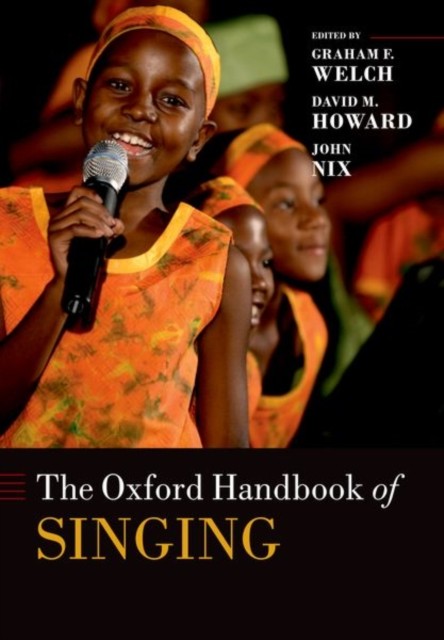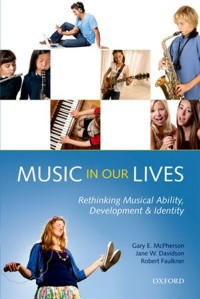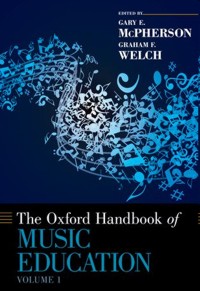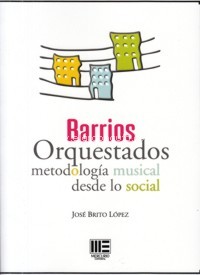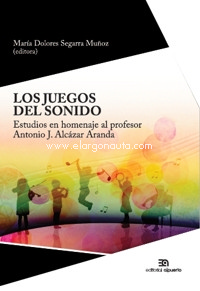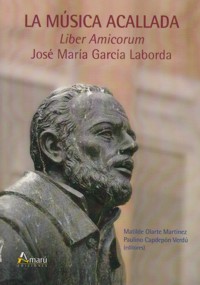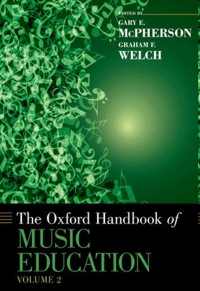
The Oxford Handbook of Music Education, vol. 2
McPherson, Gary E.
;Welch, Graham
Oxford University Press. 2012Ficha técnica
- EAN: 9780199928019
- ISBN: 978-0-19-992801-9
- Editorial: Oxford University Press
- Fecha de edición: 2012
- Encuadernación: Cartoné con sobrecubierta
- Dimensiones: 18x25,5
- Idioma: Inglés
- Nº páginas: XXXVII+728
Impresión bajo demanda
Disponibilidad sujeta a la información del editorPVP. 263,70€
Añadir a la Lista de deseos
Music education takes place in many contexts, both formal and informal. Be it in a school or music studio, while making music with friends or family, or even while travelling in a car, walking through a shopping mall or watching television, our myriad sonic experiences accumulate from the earliest months of life to foster our facility for making sense of the sound worlds in which we live. "The Oxford Handbook of Music Education" offers a comprehensive overview of the many facets of musical experience, behavior and development in relation to this diverse variety of contexts. While the first volume primarily focuses on children during school-age years, this second collects an international list of contributors to explore how music learning takes place outside of the traditional classroom environment. Discussing a range of issues such as music education for the special needs population, music learning in adulthood, and music learning through media and technology these chapters help to broaden conceptions of music and musical involvement. Whether they are used individually or in tandem, the two volumes of The Oxford Handbook of Music Education update and redefine the discipline, and show how individuals across the world learn, enjoy and share the power and uniqueness of music.
CONTENIDO:
Handbook Preface
Acknowledgments
External referees
Part 1. Special Abilities, Special Needs (ed. Adam Ockelford)
1. Commentary: Special abilities, special needs (Adam Ockelford)
2. Mapping musical development in learners with the most complex needs: The Sounds of Intent project (Adam Ockelford, Graham Welch)
3. Exceptional musical abilities: Musical prodigies (Gary E. McPherson, Andreas C. Lehmann)
4. A fresh look at music therapy in Special Education (Katrina McFerran, Cochavit Elefant)
5. Inclusive music classrooms and programs (Judith A. Jellison)
6. Preparing for the future: Music students with Special Education needs in school and community life (Alice-Ann Darrow, Mary S. Adamek)
Part 2. Music in the Community (ed. David Elliott)
1. Commentary: Music in the community (David J. Elliott)
2. The community within community music (Lee Higgins)
3. Community music and social capital (Patrick M. Jones, Thomas W. Langston)
4. Community music therapy (Kenneth Aigen)
5. Community music and social justice: Reclaiming love (Marissa Silverman)
6. Sonic hospitality: Migration, community and music (Helen Phelan)
7. At-risk youth: Music-making as a means to promote positive relationships (Mary L. Cohen, Laya Silber, Andrea Sangiorgio, Valentina Iadeluca)
8. Fast forward: Emerging trends in community music (Kari K. Veblen, Janice L. Waldron)
Part 3. Adult Learning Within A Lifespan Context (ed. David E. Myers, Chelcy L. Bowles)
1. Commentary: Adult learning within a lifespan context (David E. Myers)
2. Elders and music: Empowering learning, valuing life experience, and considering the needs of aging adult learners (William M. Dabback, David S. Smith)
3. Adult music learning in formal, nonformal, and informal contexts (Kari K. Veblen)
4. Music teacher education: Crossing generational borders (Jody L. Kerchner, Carlos R. Abril)
5. The role of higher education in fostering musically engaged adults (Chelcy L. Bowles, Janet L. Jensen)
6. Lifelong learning for professional musicians (Rineke Smilde)
7. An international perspective on music education for adults (John Drummond)
Part 4. Musical Creativity as Practice (ed. Pam Burnard)
1. Commentary: Musical creativity as practice (Pamela Burnard)
2. Empathy and creativity in group musical practices: Towards a concept of empathic creativity (Ian Cross, Felicity Laurence, Tal-Chen Rabinowitch)
3. Intercultural tensions and creativity in music (Eva Saether, Alagi Mbye, Reza Shayesteh)
4. Communal creativity as socio-musical practice (Eleni Lapidaki, Rokus de Groot, Petros Stagkos)
5. Assessing creativity in music: International perspectives and practices (Samuel Leong, Pamela Burnard, Neryl Jeanneret, Bo Wah Leung, Carole Waugh)
6. Creativity in partnership practices (Bernadette D. Colley, Randi Margrethe Eidsaa, Ailbhe Kenny, Bo Wah Leung)
Part 5. Music Learning and Teaching Through Technology (ed. Evangelos Himonides)
1. Commentary: Music learning and teaching through technology (Evangelos Himonides)
2. The misunderstanding of music-technology-education: A meta perspective (Evangelos Himonides)
3. Technology and the educator (Ross Purves)
4. The student prince: Music-making with technology (Andrew King)
5. Driving forward technology's imprint on music education (Jonathan Savage)
Part 6. Media, Music and Education (ed. Matthew Thibeault)
1. Commentary: Media, music and education (Matthew D. Thibeault)
2. Music education in the postperformance world (Matthew D. Thibeault)
3. Let's Play! Learning music through video games and virtual worlds (Evan S. Tobias)
4. Collaborative digital media performance with generative music systems (Andrew R. Brown, Steven C. Dillon)
5. Music learning and new media in virtual and online environments (S. Alex Ruthmann, David G. Hebert)
Part 7. Critical Reflections and Future Action (ed. Gary McPherson, Graham Welch)
1. Commentary: Critical reflections and future action (Gary E. McPherson, Graham F. Welch)
2. Politics, policy and music education (Hal Abeles)
3. Instrumental teachers and their students: Who's in the driving seat? (Nick Beach)
4. University professors and the entrepreneurial spirit (Liora Bresler)
5. Pride and professionalism in music education (Richard Colwell)
6. Pondering the grand experiment in public music education (Robert A. Cutietta)
7. Music education and some of its sub-fields: Thoughts about future priorities (Lucy Green)
8. Music education - An unanswered question (Wilfried Gruhn)
9. Improving primary teaching - Minding the gap (Sarah Hennessy)
10. International music education: Setting up a global information system (Liane Hentschke)
11. The responsibility of research in defining the profession of music education (Christopher M. Johnson)
12. Constructing communities of scholarship in music education (Estelle R. Jorgensen)
13. Internationalising music education (Andreas C. Lehmann)
14. Emotion in music education (Richard Letts)
15. Music education from a slightly outside perspective (Hakan Lundström)
16. Research issues in personal music identification (Cliff Madsen)
17. Preparation, perseverance, and performance in music: Views from a program of educational psychology research (Andrew J. Martin)
18. Music therapy in schools: An expansion of traditional practice (Katrina McFerran)
19. Embracing new digital technologies - Now and into the future (Bradley Merrick)
20. Challenges for research and practices of music education (Bengt Olsson)
21. All theoried up and nowhere to go (Bennett Reimer)
22. Make research, not war: Methodologies and music education research (Wendy L. Sims)
23. The preparation of music teacher educators: A critical link (David J. Teachout)
24. Music and the arts: As ubiquitous and fundamental as the air we breathe (Rena Upitis)
25. There is nothing complex about a correlation coefficient (Peter R. Webster)
26. Dewey's bastards: Music, meaning, and politics (Paul Woodford)
Index


